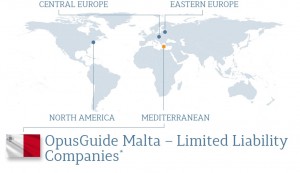 OpusGuide: Malta – Limited Liability Companies
OpusGuide: Malta – Limited Liability Companies
Malta is a member of the EU and has an advantageous
tax system which allows tax to be reduced to an effective
rate of 0%. Costs relating to registering an entity in
Malta are relatively low. The country’s policy is one of
attracting investors from the financial sector in particular.
Setting up a company in Malta takes one day.
Download: OPUS_GUIDE_MALTA_spółkazoo_ENG
| LEGAL FORM | Private Company Limited by Shares |
| POLISH EQUIVALENT | Limited Liability company under the Polish law |
| SPHERE OF ACTIVITIES | Any operational activities; no requirement to obtain permits (not a regulated activity). |
| GOVERNING BODIES AND OTHER IMPORTANT POSITIONS / FUNCTIONS | ownership | General meeting (annual / extraordinary) – made up of shareholders (it’s possible to set up a company with a sole shareholder), whose influence on activities is reflected in resolutions. Written voting is allowed. |
| management | Board of Directors – it is based on the Anglo-Saxon model (supervisory and management functions are found all in one body); at least one member is a natural person or legal person (with the exception of single-person companies). | |
| supervisory | Supervisory functions are carried out by the Board of Directors, due to the Anglo-Saxon structure of the company. | |
| other | Company Secretary is responsible for the internal documentation of the company; only a natural person can fulfil this function. | |
| USE OF TRUSTEESHIPS | nominal shareholder | Provided for under Maltese law, trustee’s secret is binding. |
| fiduciary management | Regulated under Maltese law, trustee’s secret is binding. | |
| MINIMUM SHARE CAPITAL | Issued Share Capital is a minimum of 1,164.69 Euros. If it rises to 1.200 Euros there is the possibility of paying only 20% of the capital. Authorised Share Capital is a minimum of 1,164.69 Euros. NB: at this level all (100%) of the capital must be paid. |
|
| ACCOUNTING/AUDIT | Carried out in accordance with International Accounting Standards (ISA); every year an audited financial statement must be submitted; there are exemptions from the requirement to carry out an audit. | |
| HEADQUARTERS | Required in the territory of Malta. | |
| TIMESCALES | Establishment | The company exists from the moment it is entered in the Maltese Registry of Companies, carried out after at least 3 working days from the submission of the registry application. |
| Dissolution | This requires the formal appointing of the Company’s liquidator. It takes from 6 to 12 months depending on the number of transactions carried out by the Company. | |
| Strike-off | Strike-off applies to companies which do not carry out any economic activity and have no liabilities. The timescale for strike-off is set individually. | |
| BANK ACCOUNT | In any bank including those outside Malta. | |
| NATIONAL CURRENCY | Euro | |
| OFFICIAL LANGUAGE | Maltese and English. | |
| FINANCIAL YEAR | The same as the calendar year. Other accounting periods may be chosen. | |
| TAX RESIDENCY | The company acquires Maltese residency if it is registered or its management is conducted in Malta. |
| INCOME TAX (CIT) AND TAX REFUNDS | The CIT tax rate is 35%. Under Maltese law there is a tax refund system. A shareholder of the company (not a resident of Malta), at the moment of payment of a dividend, may apply to have part of the income tax – paid in advance by the company – returned. This allows an effective rate of taxation of 0-5% to be achieved. |
| SPECIAL TAX REGIME | Holding companies: in Malta income from dividends as well as capital gains (from the sale of stocks and shares) are exempt from tax if 1 or 5 conditions is fulfilled, for example the existence of capital relations at a level of 10%, or a minimum value of the investment of 1,146,000 Euros for at least 183 days. |
| WITHOLDING TAX (WHT) | Dividends, royalties and interest paid to non-residents are exempt from WHT. |
| ANTI-TAX -AVOIDANCE RULES | Transfer pricing: NO. Thin capitalization: NO. CFC: NO. |

